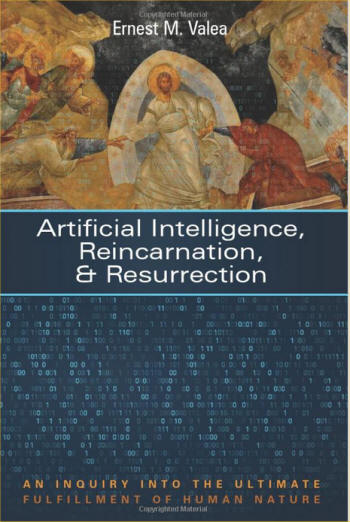Catholic Medical Quarterly Volume 71(4) November 2021
Book Review
Artificial Intelligence, Reincarnation & Resurrection.
An Inquiry Into The Ultimate Fulfilment of Human
Nature
by Ernest M. Valea. IPF and Stock Publishers
Reviewed by Dr Pravin Thavasathan
 This
highly readable book seeks to examine the different ways in which we have
sought to defeat death and find immortality. Different disciplines
including philosophy, religion and science are examined.
This
highly readable book seeks to examine the different ways in which we have
sought to defeat death and find immortality. Different disciplines
including philosophy, religion and science are examined.
Are we just physical machines with brains as hardware on which consciousness operates? Can our minds be uploaded into a machine which does not suffer the frailty of our biological bodies? In the first three chapters, the author examines what we mean by mind and the ways in which artificial intelligence can give hope to the physicalist project of achieving immortality in transhumanism. The author convincingly concludes that transhumanism cannot fulfil the dream of engineering immortality because we are not machines run by algorithms. We have a nonphysical part, the soul, individually created by God to make us conscious beings. Artificial intelligence cannot be used to build "conscious" robots. We are not just smart machines. We should not follow the false delusion that we do not possess an immortal soul that are called to union with God by means of supernatural death.
The fourth chapter looks at the way human nature is defined in two of the world religions: Hinduism and Buddhism. For personal reasons, I found this chapter especially enjoyable. Hinduism claims we defeat death by possessing a non-physical self that does not die but undergoes reincarnation in accordance with the laws of Karma. Do we keep what we sow? No: One person sows and another reaps since no personal characteristics can be preserved from one incarnation of the impersonal self to the next. Buddhism does not even acknowledge any permanent part of ourselves unaffected by change. As Christians, we cannot accept reincarnation for many reasons. It compromises God's sovereignty over creation. Belief in reincarnation affects our motivation for moral living. I recall a famous recent convert from Buddhism to Catholicism arguing that there is not much incentive for moral living if we cannot identify ourselves with future reincarnations. If there is no real self, who inherits our deeds in this life and reincarnates? Only Karma passes from one life to another. If reincarnation is true, there is no need for Christ's redemptive sacrifice.
The author examines the claim sometimes made that the Early Church believed in reincarnation. After all, is it not written that John the Baptist is Elijah come back to life? No, the Early Church taught from the perspective of Biblical typology: John is a type of Elijah, preaching repentance. They have the same roles, not the same personal identity.
The highlight of this work for me is on the teachings of Thomas Aquinas on human nature. For Aquinas, to be made in the image of God means we are rational creatures with reason and free-will. Our personal status is not something we need to get rid of, in contrast to Eastern religions. That is why there can be no such thing as Christian Vedanta, as appealing as the idea might be.
For Christians, immortality is accomplished through eternal communion with God in a resurrected body. This is the fulfilment of our human nature, our vocation. The author has put forward a clear case for Christian orthodoxy in his examination of the ultimate fulfilment of human nature.
